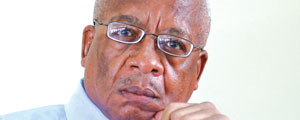
The wheels of justice turn slowly, but when it’s eventually delivered, it’s worth the wait. Column by Conway Tutani
So was the case pitting the Anglican Church of the Province of Central Africa against a breakaway faction led by excommunicated bishop Nolbert Kunonga.
Justice might have been delayed, but it was certainly not denied. This was one of the most eagerly-awaited and welcome judgments in independent Zimbabwe.
The case took all of five years, but justice was finally done.
Kunonga had the flimsiest of grounds to occupy Anglican Church premises, apparently egged on by powerful individuals as he made the right political noises to throw out his rivals.
All the judges — from the High Court to the Supreme Court — showed jurisprudential sharpness in the rulings, except, to me, High Court judge Justice Ben Hlatshwayo, who made the initial, ill-considered shocking decision that all Anglican property belonged to the breakaway faction, a decision which led to the prolonged legal wrangle.
Now, when the Anglican Church split from the Roman Catholic Church, did it claim Catholic property? When the Wesleyan Methodist Church broke away from the Anglicans, did it demand the assets of the Anglicans?
Here in Zimbabwe, when the Zimbabwe Assemblies of God Africa (ZAOGA) split from the Apostolic Faith Mission (AFM) Church, did it take away property it found there? When Emmanuel Makandiwa broke away from AFM to form the United Family International Church, did he claim AFM property?
- Chamisa under fire over US$120K donation
- Mavhunga puts DeMbare into Chibuku quarterfinals
- Pension funds bet on Cabora Bassa oilfields
- Councils defy govt fire tender directive
Keep Reading
Ruled the Supreme Court, presided over by Deputy Chief Justice Luke Malaba: “. . . they (the Kunonga faction) had no right to continue in possession of the congregational buildings when they had departed from the fundamental principles and standards from which the church is founded.
They left it, putting themselves beyond its ecclesiastical jurisdiction.” A church with such a rich tradition and history could not be allowed to be wiped off the map by Kunonga just like that.
But it’s strange how this self-evident truth escaped Justice Hlatshwayo, a learned judge.
So, it’s not a surprise at all that the Supreme Court overturned his verdict in its entirety. Judges should really put their minds to their work than take a narrow view.
After his crushing defeat this week, all Kunonga could say was that homosexuality had carried the day whereas the issue was much more than that as pointed out by Justice Malaba in the Supreme Court’s final verdict.
What about the debauchery reportedly going on at Anglican premises which have been “turned into bedrooms and brothels”? It is this disconnect in Kunonga’s thinking which his troubles can be traced to and which has led to his fall from grace.
In Kunonga’s case, there was no organisation to talk about as he ran the church with a hotch-potch of clueless and unqualified loyalists and enforcers, resulting in administrative collapse, as seen in the grime and vice at those Anglican premises he had taken over.
There was also no accountability or responsibility. With all those colleges and crèches paying fees and rentals pouring in, how could they accumulate the reported astronomical bills? It’s obvious that it had become a free-for-all with anyone so inclined helping themselves to the money.
Independent African churches, which broke away from missionary churches, grew fast and wide because they gave Africans a new self-respect while inculcating in them values of thriftiness, sobriety and hard work, playing an important role in blacks’ growing prosperity.
Can this be said of the Kunonga faction?
The policies and ways of church leadership may be godly or they may be ungodly. The way leadership is exercised is tremendously important to the membership. But in the Kunonga saga, there was total lack of appreciation of the church being at the service of the people, an absence of the church’s mission to covert; they were not known for prayer or charitable deeds. As well as inspiring people, great preachers also organise them, forming permanent congregations with clearly defined rules.
Now Kunonga has to bear all the court costs of the case as his followers desert him. His lawyers ought to bear some responsibility for not advising him to give up the futile fight when the costs were still manageable. So, he faces both financial and spiritual insolvency.
At the end of it all, Kunonga’s faction was not recognisable as a church at all.
It all got sidetracked or lost in Kunonga’s determined bid to have total control, unwilling to compromise and not hesitating to call in the police to remove his rivals who were peaceful all the time.
This meanness of spirit is not edifying for a church leader; it is not spiritually or morally exemplary from a purported man of the cloth. What now, Kunonga?











